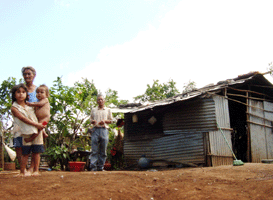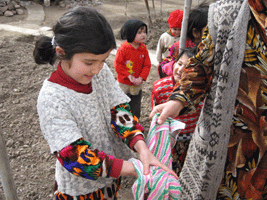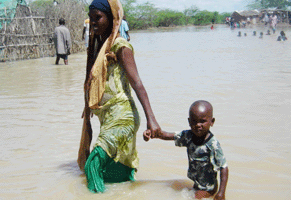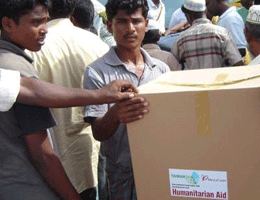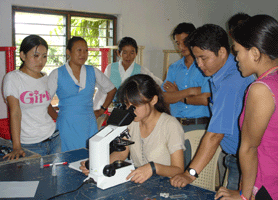
Humanitarian Assistance Helps Rebuild Communities
|
|
|
|
The Taiwan International Cooperation Development Fund (TaiwanICDF) supports partner countries with technology transfer, financial assistance, and human resource cultivation based on Taiwan's economic development experience. The TaiwanICDF's humanitarian assistance program seeks to support the long-term development of partner countries and prepare alternative measures for responding to short-term or emergency issues.
In 2001, the fund formally began to organize humanitarian assistance programs to respond to natural or man-made disasters. The main operations include disaster relief, improvement of basic medical infrastructure, donation of goods and supplies, and poverty reduction.
Two strategic approaches
The TaiwanICDF's international humanitarian assistance operations are conducted in accordance with the policies of other international development organizations. The various stages include demand and benefit evaluation, assistance in project design, implementation and supervision, and post-project evaluation. The TaiwanICDF's projects integrate domestic and overseas resources. This includes combining the Fund's resources with the expertise of NGOs and the governments of partner countries; utilizing the resources of the overseas Taiwan technical missions in providing technical assistance for post-disaster reconstruction; and working with other international organizations to tap the strengths and skills of local people. With these priorities, the TaiwanICDF is able to assist partner countries with long-term renewal, while at the same time gaining invaluable experience from its cooperative relationships.
|
The TaiwanICDF has adopted two strategic approaches in the implementation of its humanitarian assistance projects. The first involves the coordination of the organization's core programs in technical assistance, human resource development, and microfinancing, as well as the dispatch of volunteers. The integration of these key components maximizes the impact of projects, allowing short-term aid to pave the way for longer-term development cooperation.
Secondly, as mentioned above, the TaiwanICDF cooperates with domestic and international NGOs. These partnerships improve resource sharing and facilitate greater participation in international affairs. Domestic NGOs introduce Taiwan's expertise in particular fields, which can then be tailored to the specific requirements of partner countries. This also gives the international community an insight into Taiwan's unique strengths and advantages. Meanwhile, by cooperating with international NGOs, the TaiwanICDF improves the efficiency and effectiveness of its assistance programs by gaining access to the network and expertise of those NGOs.
International partnerships reinforce emergency relief
|
The TaiwanICDF has worked with the renowned international NGO Mercy Corps on various projects since 2003 when they first cooperated on delivering relief materials to internally displaced persons (IDPs) in Iraq. In subsequent years, the two organizations worked together on public health initiatives in Central Asia, with the TaiwanICDF providing funding and skilled volunteers. Meanwhile, the cooperative relationship was consolidated last year with the establishment of the Emergency Response Fund, an emergency aid and disaster relief mechanism.
The Emergency Response Fund was established for an initial 3-year term, with each co-founder investing US$500,000. The contract memorandum was formally signed on April 21, 2006.
One of the Fund's first projects involved the resettlement of IDPs in Sri Lanka in September, 2006. The urgent objective of this project was to provide emergency assistance to people whose homes had been destroyed by ongoing civil strife. Relief materials and supplies were purchased with funding from both parties and delivered during eleven visits to four towns in the southeast of Sri Lanka. A total of 480 households and 2,400 people benefited from this assistance project.
A couple of months later, the TaiwanICDF was involved in another successful case: The Kenyan Disaster Relief project. A serious flood had occurred in the northeast of the east African nation, leaving many people homeless. Materials and supplies were delivered to the disaster zones, and 1,200 households have benefited from this assistance drive, which ─ at time of press ─ was still in progress.
Cooperating with domestic NGOs to provide basic medical services
|
Also in 2006, the TaiwanICDF was involved in a collaborative effort with the Taiwan Tibet Exchange Foundation, a Taiwan NGO. The project focused on improving the living standards of Tibetan exiles in northern India by providing basic medical care and hygiene services.
The location was Orissa, India, an area that has approximately 3,500 Tibetan refugees who lack adequate medical resources. There was a high incidence of malaria, with about a quarter the total malaria cases in India coming from this region. Due to its rural location, no NGO has settled there to provide medical assistance.
This project entailed the installation of malaria examination facilities, training of medical personnel in malaria prevention, and construction of water towers and electrical facilities.
The medical personnel successfully acquired the skills needed to apply the crucial Quantitative Buffy Coat (QBC) technique. Timely implementation of this technique not only improved malaria prevention, but also lowered the mortality rate of the infected. The construction of water towers and electrical facilities helped the hospitals provide better medical services. In addition, five villages in Orissa and Mainpat in the Tibetan area, as well as 20 Indian villages in the surrounding areas, received 3,957 pesticide-treated mosquito nets.
Medical and hygiene conditions were greatly improved, and the malaria infection rate was successfully lowered. In all, almost 10,000 people benefited from these efforts.
A commitment to help
|
As a conscientious member of international society, Taiwan considers it a duty to contribute to the welfare of developing countries. The nation's sense of obligation stems, in part, from its gratitude toward the international community for the aid it received in the 1950-60s. In keeping with the spirit of this responsibility, the TaiwanICDF intends to strengthen its international humanitarian assistance operations by focusing on the following areas: (1) Expanding the scope of its operations (2) Reinforcing cooperation with NGOs and other international development organizations (3) Balancing emergency relief and long-term development.
In light of the correlation between humanitarian aid and basic human rights, the TaiwanICDF is also considering incorporating human rights preconditions, such as health, nutrition, sanitation, poverty relief, and the care and protection of children, into its work.
The TaiwanICDF intends to build on its experience in humanitarian assistance, in order to make its operations even more effective in the future. The organization aims to maximize the benefits of its existing cooperative partnerships, while looking to foster new ties with international NGOs and aid institutions. Working with like-minded organizations, and the governments and citizens of partner countries, the TaiwanICDF will continue to engage in disaster relief, reconstruction work, poverty reduction, and medical assistance, helping to lay the foundations for long-term development.
* This article is a collaborative work between Taiwan News and the TaiwanICDF.
- 更新日期: 2022/05/11
- 點閱次數:545

